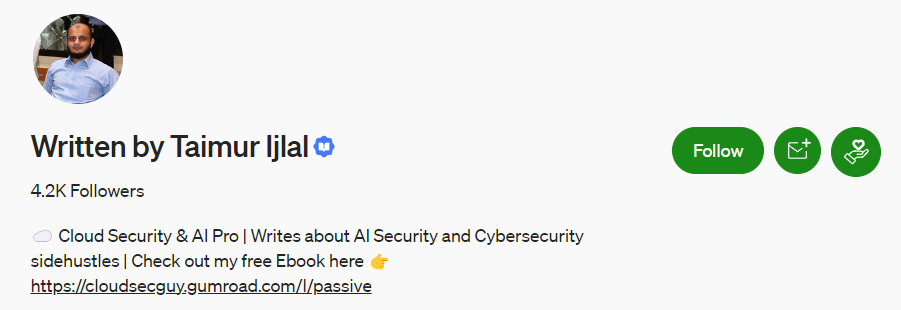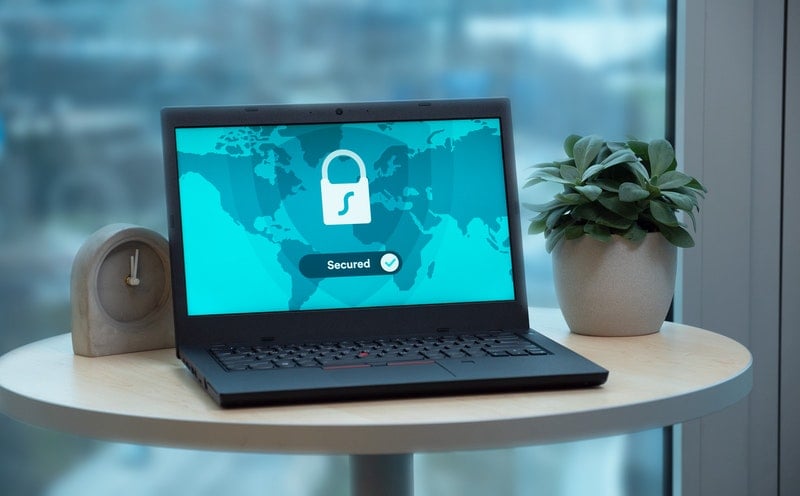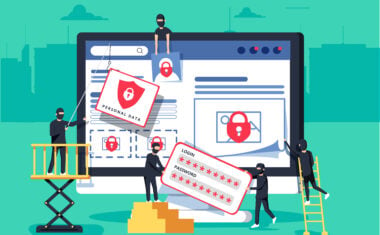Free Cybersecurity Course
Enter the cybersecurity field with our free introductory course. Learn the basics and build a strong foundation.
As businesses increasingly grapple with ever-evolving digital threats, cybersecurity freelancers are likewise increasingly in demand. Freelance cybersecurity experts offer organizations an opportunity to plug gaps in their security infrastructure measures without the financial commitment of a full-time employee. This presents an opportunity to shape your career on your own terms, providing flexible hours, the opportunity to choose your clients, and the potential for higher earnings.
Yet, transitioning from a traditional role to a freelance cybersecurity expert can be intimidating. And like any freelance position, this can be particularly difficult at the beginning, when you’re just starting out.
That’s why we’ve created this guide. We’ll explore every facet of the cybersecurity freelancing world, including tools and insights, helping you navigate your way through these challenges.
What Does a Freelance Cybersecurity Specialist Do?
A freelance cybersecurity specialist identifies malicious actors and potential security vulnerabilities, assesses risks, and implements preventive measures to keep their clients’ networks, systems, and data safe from cyber threats. Unlike in-house cybersecurity professionals, freelance specialists are not tied to a single organization and generally work on a project-by-project basis.
Going the Freelance Route in Cybersecurity: Pros and Cons
Let’s examine the pros and cons of going the freelance route in cybersecurity.
Pros
Becoming a cybersecurity freelancer can bring you innumerable advantages, ranging from flexibility to financial potential. Here are some of the pros:
- Flexibility. As a freelancer, you can set your own hours and work from virtually anywhere, provided you have a stable internet connection.
- Diverse projects. Taking on various cybersecurity projects from different industries provides you with multiple experiences and challenges.
- Potential for higher income. While there’s no guarantee, the potential for a higher income exists in freelancing, particularly for highly skilled or experienced specialists.
- Autonomy. As a freelance cybersecurity analyst, you can work on projects that align with your career goals and interests.
- Skill development. The diversity of projects and clients could accelerate your learning and skill development in different cybersecurity areas.
Cons
The cybersecurity freelance route doesn’t come without its challenges. Here are some potential downsides to consider:
- Inconsistent income. Unlike a salaried position, freelancing may result in an unpredictable income.
- Finding clients. It can be a challenge to continuously find new clients, particularly when you’re first starting out.
- Lack of benefits. As a freelancer, you are responsible for your own healthcare, retirement plans, and other benefits, which an employer generally provides.
- Administration. As a freelancer, you’ll also need to manage the business side of your work, including taxes, invoicing, and legal contracts.
- Isolation. Freelancing can sometimes be lonely, especially if you’re working from home and don’t interact with a team daily.
How To Become a Freelance Cybersecurity Specialist: An 8-Step Guide
Becoming a freelance cybersecurity specialist is a journey in itself, filled with new challenges and opportunities. Here’s an 8-step guide to help you navigate this path.
-
Make a Concrete Plan
-
Determine Your: Niche, Services, Pricing
-
Build Your Online Presence
-
Establish Your Freelance Business
-
Determine Your Lead Generation Sources and Land Your First Client
-
Keep Your Clients Happy
-
Expand Your Network and Join the Freelance Cybersecurity Community
-
Continue To Hone Your Skillset and Gain New Skills
Make a Concrete Plan
Planning is critical before diving headfirst into the freelancing world. Focus on the following aspects.
Invest Time in Research To Ensure It’s the Right Move for You
Dedicate time to research and understand what freelancing entails, specifically within the cybersecurity domain. Evaluate your current skills, identify any gaps, and consider the personal and professional sacrifices that come with freelancing. Investigate the market and understand the demand for high-quality services.
This preliminary step will help you determine whether this path aligns with your career aspirations and lifestyle.
Take On One Client To Test the Waters Before Making the Leap
Before leaving a full-time position, consider taking on a single freelance project. This approach allows you to gain first-hand experience in dealing with clients, managing projects, and handling the administrative side of freelancing without the full risk of transitioning.
Create a Roadmap for Your Freelancing Journey
A well-drafted roadmap can be your guide through the freelancing journey. Identify your short-term and long-term goals, detailing the steps necessary to achieve them. These can include timelines for skill development, client acquisition, and income projections.
Revisit and revise your roadmap regularly to accommodate changing circumstances or goals.
Save for an Emergency Fund
An emergency fund is crucial when transitioning to freelancing, as income can be inconsistent, particularly in the early stages. This fund should cover at least three to six months of living expenses to provide a safety net during quiet periods.
Determine Your:
When striking out on your own, it’s a good idea to consider your niche, your services, and your price point.
Niche
Selecting a niche or specialization within cybersecurity sets you apart in a crowded market. This could be anything from network security to cloud security or a specific industry like healthcare or financial services. Your chosen niche should align with your skills, interests, and market demand.
Services
Clearly outline the services you’ll be providing. This could include security assessments, penetration testing, security policy development, security incident response, or cybersecurity training. Having a straightforward service offering makes it easier for potential clients to understand what you can do for them.
Pricing
When determining your pricing, look at factors such as the project’s complexity, the client’s budget, your expertise, and market rates. You need to strike a balance between offering competitive prices and ensuring your rates are sustainable for your business.
Build Your Online Presence
Having an online presence as a cybersecurity freelancer is necessary to show off your skills and professional experience. Here are a few ways to build your online presence.
Optimize Your LinkedIn Profile
LinkedIn is among the best places to showcase your experience, skills, and qualifications. Even more so, it’s a great way to show off your personality and build a personal brand.
Optimize your profile with relevant keywords, and include a concise summary highlighting your expertise and accomplishments. Don’t forget to work on a unique value proposition and determine what sets you apart from others in the cybersecurity industry.
Build a Strong Portfolio
Your portfolio should highlight your past projects, successes, and skills and include detailed case studies where possible, showcasing the problems you’ve solved and the value you’ve brought to previous clients.
You can add this portfolio on your LinkedIn or personal website.
Update Your Resume
Even as a freelancer, maintaining an up-to-date resume is crucial. Include your recent projects, skills, cybersecurity certifications, and accomplishments. Remember to tailor it to highlight your expertise as a cybersecurity specialist.
Create a Website
Although optional, building a professional website can serve as a centralized place for potential clients to learn about you and your services, view your portfolio, and get in touch. A website always adds credibility and enhances your online presence.
Establish Your Freelance Business
Proper setup of your business is essential to managing the administrative side of freelancing. Here’s a step-by-step guide.
Register Your Business
Business registration gives your operation legitimacy and can offer certain legal protections. The process and requirements vary by location, so research and adhere to local laws and regulations.
Find the Right Working Environment
This could be a home office, a local co-working space, or even a coffee shop. Choose a place that best suits your work style and minimizes distractions.
Build Your Tech Stack
As a cybersecurity specialist, you’ll need the right software and hardware tools, like VPNs, intrusion detection systems, and penetration testing tools. Also, consider investing in project and product management and invoicing tools.
Create Standard Documents and Templates
Prepare standardized documents such as proposals, contracts, invoices, and project briefs. This saves time and ensures you appear professional and organized to your clients.
Determine Your Lead Generation Sources and Land Your First Client
Finding clients often involves identifying effective lead-generation sources. Let’s explore the different ways you can find your next client.
Freelance Platforms and Marketplaces
Platforms like Upwork, Freelancer, Fiverr, and GLG Consulting can be excellent starting points for finding clients. Create compelling profiles on these platforms, highlighting your expertise and past work.
Keep in mind that these platforms are very competitive, so having a unique proposition and a strong background is often the key.
Job Boards
Both general and niche-specific job boards can offer freelance jobs and opportunities. Check out websites like Indeed, SimplyHired, and CyberSecurityJobs.
Online and Slack Communities
Joining online communities like forums, Slack groups, or LinkedIn groups related to cybersecurity can provide networking opportunities and potential leads. What’s more, these platforms often serve as valuable places for staying updated on industry trends and job openings.
Tap Into Your Network
Leverage your existing network of friends, family, former colleagues, and professional contacts. Let them know about your new venture as a freelance cybersecurity specialist.
Keep Your Clients Happy
Satisfied clients will likely give you repeat business, refer you to others, and provide positive testimonials, further enhancing your reputation. Because of that, you should consistently deliver exceptional services and go above and beyond to meet your client’s needs. Whenever you complete a project, ask for testimonials—especially video testimonials—that can be shared with other potential clients.
Expand Your Network and Join the Freelance Cybersecurity Community
Networking can lead to collaborations, partnerships, and new business opportunities. Make sure to attend industry events, webinars, and conferences, and always let people know you’re open to new projects.
Continue To Hone Your Skillset and Gain New Skills
The field of cybersecurity is constantly evolving, so continuous cybersecurity learning is crucial. Pursue relevant cybersecurity certifications, take cybersecurity courses, and stay up to date with the latest trends and security threats. Your commitment to professional development will be evident to your clients and help you remain competitive in the market.
Get To Know Other Cybersecurity Students
Jose Mendoza
Cyber Security Career Track Student at Springboard
Eric Rivera
IAM Security Specialist at Dearborn Group
Rafael Ayala
Mergers And Acquisitions at Autodesk
How Much Can You Earn as a Freelancer in Cybersecurity?
The earning potential of a cybersecurity freelancer varies depending on experience, specialization, geographic location, or the complexity of the projects.
On average, experienced freelancers in the U.S. can earn between $60 to $140 per hour, based on their hands-on experience level. Highly experienced specialists or those with sought-after skills can often demand higher rates.
Because freelancers set their own rates, those who successfully build their reputation and establish a client base can earn a higher income than salaried positions.
Freelancing in Cybersecurity: Real-Life Examples To Inspire You
Here are two real-life examples of successful freelancers in the cybersecurity field.
Taimur Ijlal

Despite receiving discouraging feedback about Fiverr being oversaturated, Taimur decided to try it out anyway. He found great success by optimizing his listing, tracking which gigs work, and overdelivering, encouraging aspiring cybersecurity freelancers to try it out and build their brand on this platform.
@WithSandra
In this video, Sandra discusses the challenges of balancing freelance work and personal life and shares her extensive experience leading a project for the first time.
Sandra’s freelance work includes a mix of project-based tasks and ticketing-based tasks involving handling ad-hoc requests related to cybersecurity. One particular aspect that we like about this example is that she discusses how AI will bring considerable benefits to the field, but a human touch will still be needed to supervise its development and have policies in place to manage potential security issues.
FAQs About Freelance Cybersecurity
We answer your most frequently asked questions.
Are Cybersecurity Freelancers in Demand?
Yes. Companies—especially small to medium-sized businesses—may not have in-house cybersecurity teams and often rely on freelancers to help protect their digital assets. Also, the surge in remote work has further heightened the need for strong cybersecurity measures, leading to even more opportunities for freelancers in this field.
What Skills Does a Cybersecurity Freelancer Need?
A cybersecurity freelancer should have a solid foundation in IT, and a deep understanding of various cybersecurity concepts. These may include network security, ethical hacking, encryption, threat and vulnerability assessment, and knowledge of network security implementation, compliance, and industry standards.
Soft skills are also essential. Freelancers should have strong problem-solving abilities and excellent communication skills to explain complex security concepts to non-technical clients.
Can a Cybersecurity Consultant Work From Home?
Yes! A security consultant can work from home or virtually anywhere with a reliable internet connection. However, this doesn’t rule out the occasional on-site visit, which may be necessary depending on the specific client’s needs and the nature of the project.
Can You Make Six Figures as a Cybersecurity Freelancer?
Making six figures as a cybersecurity freelancer is possible, though it largely depends on your experience, specialization, and the amount of work you take on.
![How To Become a Freelance Cybersecurity Expert [2023 Guide]](https://www.springboard.com/blog/wp-content/uploads/2023/10/how-to-become-a-freelance-cybersecurity-expert-2023-guide-700x467.jpeg)






